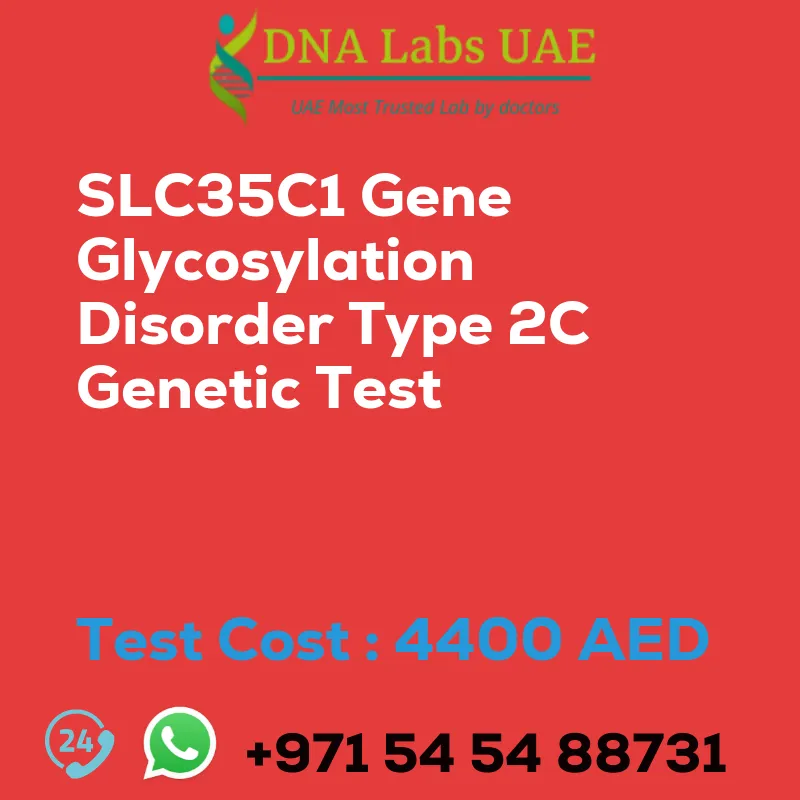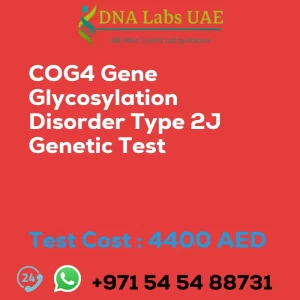SLC35C1 Gene Glycosylation Disorder Type 2C Genetic Test
At DNA Labs UAE, we offer the SLC35C1 Gene Glycosylation Disorder Type 2C Genetic Test at a cost of AED 4400.0. This test is used to diagnose Glycosylation Disorder Type 2C, a rare genetic disorder caused by mutations in the SLC35C1 gene.
Test Details
The SLC35C1 gene is responsible for encoding a protein called UDP-galactose transporter, which is crucial for the process of glycosylation. Glycosylation is a post-translational modification that affects the structure and function of proteins and lipids. When mutations occur in the SLC35C1 gene, glycosylation is impaired, leading to Glycosylation Disorder Type 2C.
Glycosylation Disorder Type 2C can cause a range of symptoms, including developmental delays, intellectual disability, facial dysmorphism, skeletal abnormalities, and organ dysfunction. To diagnose this disorder, we use Next-Generation Sequencing (NGS) technology, which allows for the simultaneous analysis of multiple genes, including the SLC35C1 gene.
During the test, a DNA sample is obtained from the patient, either through a blood sample or a buccal swab. This sample is then sequenced using NGS technology to identify any mutations or variations in the SLC35C1 gene. These mutations are crucial for confirming a diagnosis of Glycosylation Disorder Type 2C and provide valuable information for genetic counseling and managing the condition.
Test Information
- Test Name: SLC35C1 Gene Glycosylation Disorder Type 2C Genetic Test
- Components: DNA sample (blood or extracted DNA or one drop blood on FTA card)
- Price: AED 4400.0
- Report Delivery: 3 to 4 weeks
- Method: NGS Technology
- Test Type: Metabolic Disorders
- Doctor: General Physician
- Test Department: Genetics
- Pre Test Information: Clinical History of Patient, Genetic Counselling Session to draw a pedigree chart of affected family members
Please note that genetic testing for Glycosylation Disorder Type 2C should always be performed by a qualified healthcare professional or genetic counselor who can interpret the results and provide appropriate guidance and support.
| Test Name | SLC35C1 Gene Glycosylation disorder type 2C Genetic Test |
|---|---|
| Components | |
| Price | 4400.0 AED |
| Sample Condition | Blood or Extracted DNA or One drop Blood on FTA Card |
| Report Delivery | 3 to 4 Weeks |
| Method | NGS Technology |
| Test type | Metabolic Disorders |
| Doctor | General Physician |
| Test Department: | Genetics |
| Pre Test Information | Clinical History of Patient who is going for SLC35C1 Gene Glycosylation disorder type 2C NGS Genetic DNA Test A Genetic Counselling session to draw a pedigree chart of family members affected with Glycosylation disorder type 2C |
| Test Details |
The SLC35C1 gene is responsible for encoding a protein called UDP-galactose transporter, which plays a crucial role in the process of glycosylation. Glycosylation is a post-translational modification that involves the addition of sugar molecules to proteins and lipids, thereby influencing their structure and function. Glycosylation disorder type 2C is a rare genetic disorder caused by mutations in the SLC35C1 gene. This disorder leads to impaired glycosylation and can result in a variety of symptoms, including developmental delays, intellectual disability, facial dysmorphism, skeletal abnormalities, and organ dysfunction. NGS (Next-Generation Sequencing) genetic testing is a type of genetic testing that allows for the simultaneous analysis of multiple genes, including the SLC35C1 gene. NGS technology enables the rapid and cost-effective sequencing of large portions of the genome, making it a valuable tool for diagnosing genetic disorders. An NGS genetic test for SLC35C1 gene mutations involves obtaining a DNA sample from the patient, usually through a blood sample or a buccal swab. The DNA is then sequenced using NGS technology to identify any mutations or variations in the SLC35C1 gene. These mutations can help confirm a diagnosis of glycosylation disorder type 2C and provide valuable information for genetic counseling and management of the condition. It is important to note that genetic testing for glycosylation disorder type 2C should be performed by a qualified healthcare professional or genetic counselor who can interpret the results and provide appropriate guidance and support. |








